Tourism and Hospitality Industry Development
VerifiedAdded on 2020/11/23
|14
|3796
|131
Essay
AI Summary
This assignment delves into current trends shaping the tourism and hospitality industry. It examines the challenges and opportunities related to building and educating a future workforce for this sector, analyzing customer satisfaction evaluation methods used by online travel agencies. The assignment also explores international sustainable tourism policies and investigates the impact of global crises on the performance of the tourism sector in various countries.
Contribute Materials
Your contribution can guide someone’s learning journey. Share your
documents today.
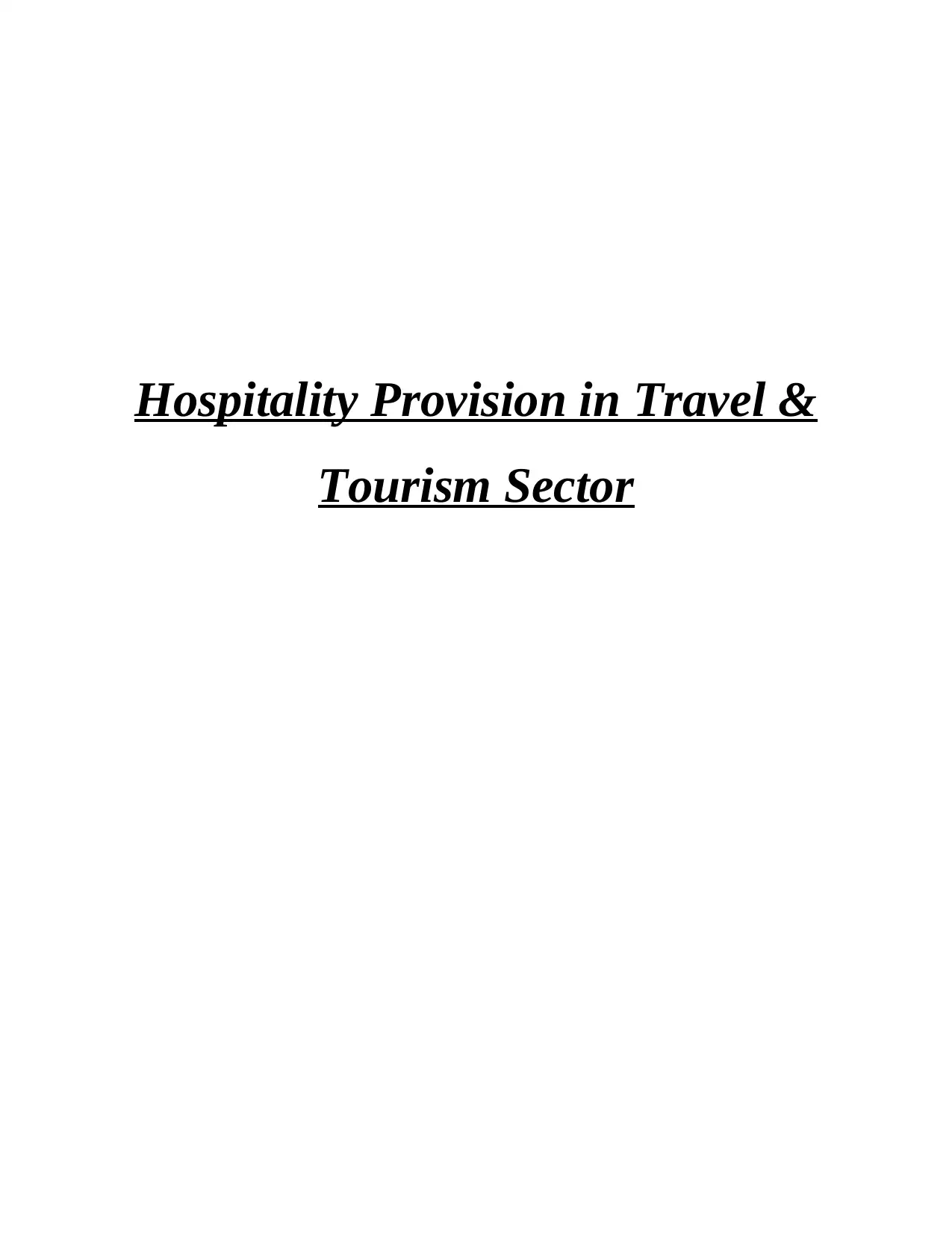
Hospitality Provision in Travel &
Tourism Sector
Tourism Sector
Secure Best Marks with AI Grader
Need help grading? Try our AI Grader for instant feedback on your assignments.
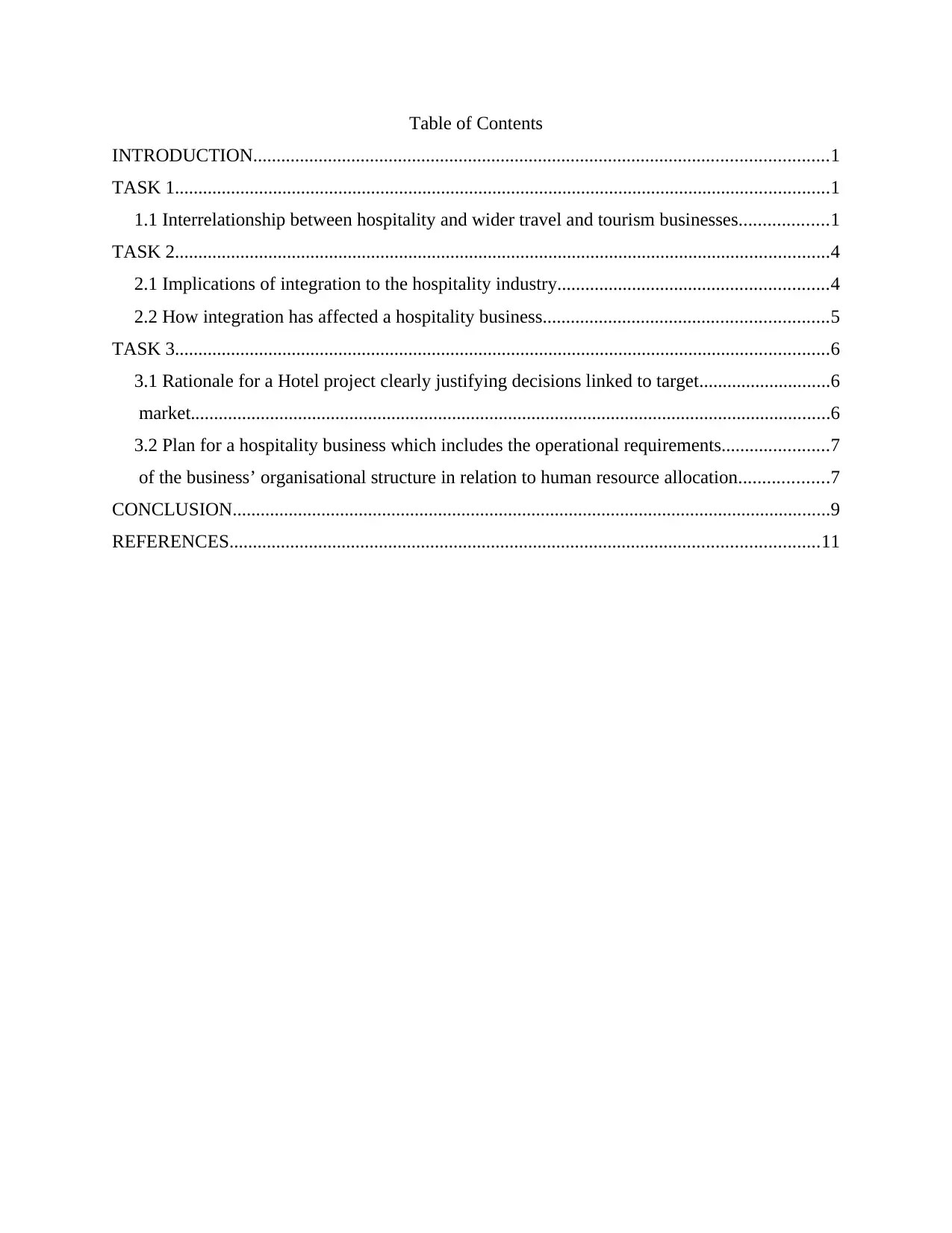
Table of Contents
INTRODUCTION...........................................................................................................................1
TASK 1............................................................................................................................................1
1.1 Interrelationship between hospitality and wider travel and tourism businesses...................1
TASK 2............................................................................................................................................4
2.1 Implications of integration to the hospitality industry..........................................................4
2.2 How integration has affected a hospitality business.............................................................5
TASK 3............................................................................................................................................6
3.1 Rationale for a Hotel project clearly justifying decisions linked to target............................6
market.........................................................................................................................................6
3.2 Plan for a hospitality business which includes the operational requirements.......................7
of the business’ organisational structure in relation to human resource allocation...................7
CONCLUSION................................................................................................................................9
REFERENCES..............................................................................................................................11
INTRODUCTION...........................................................................................................................1
TASK 1............................................................................................................................................1
1.1 Interrelationship between hospitality and wider travel and tourism businesses...................1
TASK 2............................................................................................................................................4
2.1 Implications of integration to the hospitality industry..........................................................4
2.2 How integration has affected a hospitality business.............................................................5
TASK 3............................................................................................................................................6
3.1 Rationale for a Hotel project clearly justifying decisions linked to target............................6
market.........................................................................................................................................6
3.2 Plan for a hospitality business which includes the operational requirements.......................7
of the business’ organisational structure in relation to human resource allocation...................7
CONCLUSION................................................................................................................................9
REFERENCES..............................................................................................................................11
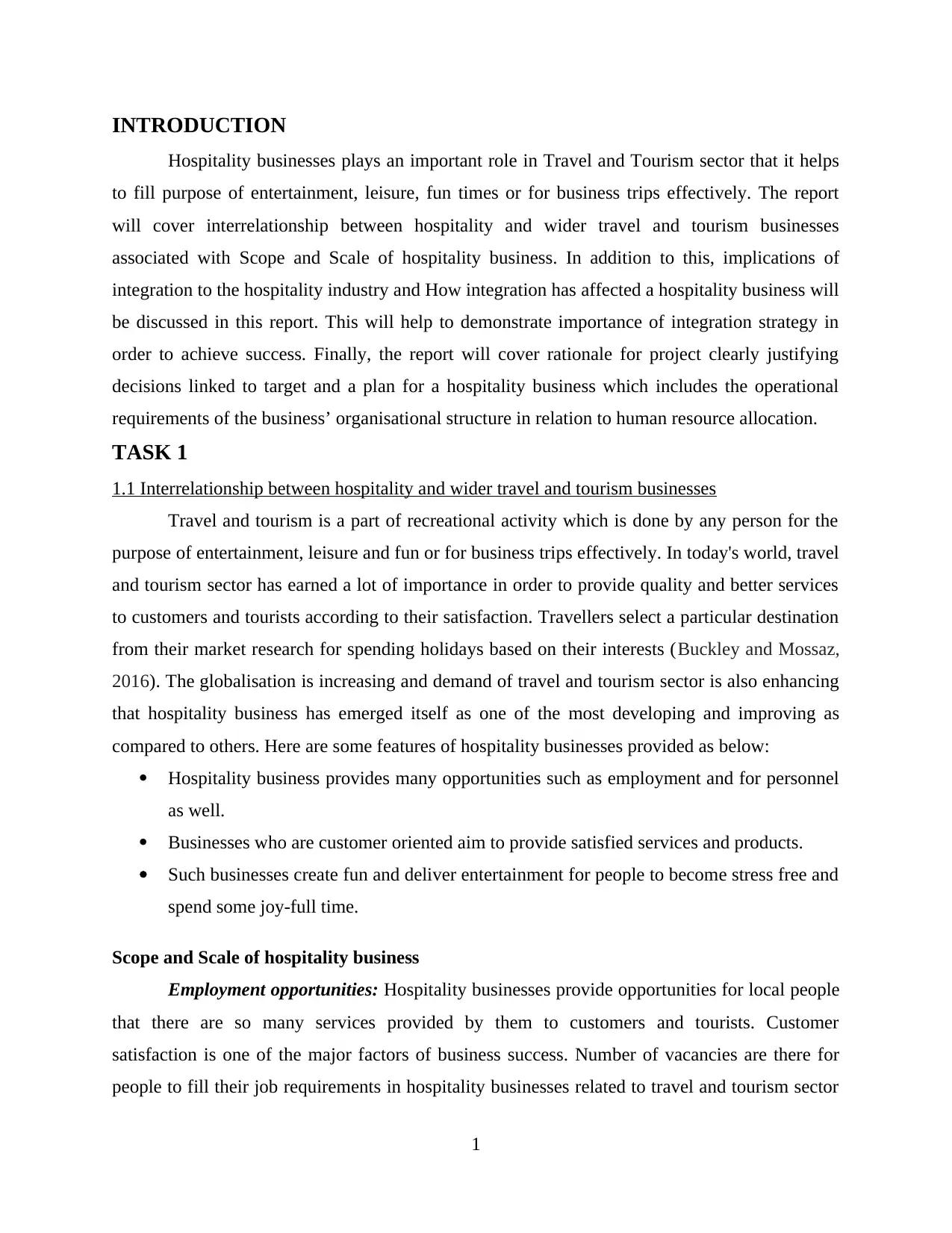
INTRODUCTION
Hospitality businesses plays an important role in Travel and Tourism sector that it helps
to fill purpose of entertainment, leisure, fun times or for business trips effectively. The report
will cover interrelationship between hospitality and wider travel and tourism businesses
associated with Scope and Scale of hospitality business. In addition to this, implications of
integration to the hospitality industry and How integration has affected a hospitality business will
be discussed in this report. This will help to demonstrate importance of integration strategy in
order to achieve success. Finally, the report will cover rationale for project clearly justifying
decisions linked to target and a plan for a hospitality business which includes the operational
requirements of the business’ organisational structure in relation to human resource allocation.
TASK 1
1.1 Interrelationship between hospitality and wider travel and tourism businesses
Travel and tourism is a part of recreational activity which is done by any person for the
purpose of entertainment, leisure and fun or for business trips effectively. In today's world, travel
and tourism sector has earned a lot of importance in order to provide quality and better services
to customers and tourists according to their satisfaction. Travellers select a particular destination
from their market research for spending holidays based on their interests (Buckley and Mossaz,
2016). The globalisation is increasing and demand of travel and tourism sector is also enhancing
that hospitality business has emerged itself as one of the most developing and improving as
compared to others. Here are some features of hospitality businesses provided as below:
Hospitality business provides many opportunities such as employment and for personnel
as well.
Businesses who are customer oriented aim to provide satisfied services and products.
Such businesses create fun and deliver entertainment for people to become stress free and
spend some joy-full time.
Scope and Scale of hospitality business
Employment opportunities: Hospitality businesses provide opportunities for local people
that there are so many services provided by them to customers and tourists. Customer
satisfaction is one of the major factors of business success. Number of vacancies are there for
people to fill their job requirements in hospitality businesses related to travel and tourism sector
1
Hospitality businesses plays an important role in Travel and Tourism sector that it helps
to fill purpose of entertainment, leisure, fun times or for business trips effectively. The report
will cover interrelationship between hospitality and wider travel and tourism businesses
associated with Scope and Scale of hospitality business. In addition to this, implications of
integration to the hospitality industry and How integration has affected a hospitality business will
be discussed in this report. This will help to demonstrate importance of integration strategy in
order to achieve success. Finally, the report will cover rationale for project clearly justifying
decisions linked to target and a plan for a hospitality business which includes the operational
requirements of the business’ organisational structure in relation to human resource allocation.
TASK 1
1.1 Interrelationship between hospitality and wider travel and tourism businesses
Travel and tourism is a part of recreational activity which is done by any person for the
purpose of entertainment, leisure and fun or for business trips effectively. In today's world, travel
and tourism sector has earned a lot of importance in order to provide quality and better services
to customers and tourists according to their satisfaction. Travellers select a particular destination
from their market research for spending holidays based on their interests (Buckley and Mossaz,
2016). The globalisation is increasing and demand of travel and tourism sector is also enhancing
that hospitality business has emerged itself as one of the most developing and improving as
compared to others. Here are some features of hospitality businesses provided as below:
Hospitality business provides many opportunities such as employment and for personnel
as well.
Businesses who are customer oriented aim to provide satisfied services and products.
Such businesses create fun and deliver entertainment for people to become stress free and
spend some joy-full time.
Scope and Scale of hospitality business
Employment opportunities: Hospitality businesses provide opportunities for local people
that there are so many services provided by them to customers and tourists. Customer
satisfaction is one of the major factors of business success. Number of vacancies are there for
people to fill their job requirements in hospitality businesses related to travel and tourism sector
1
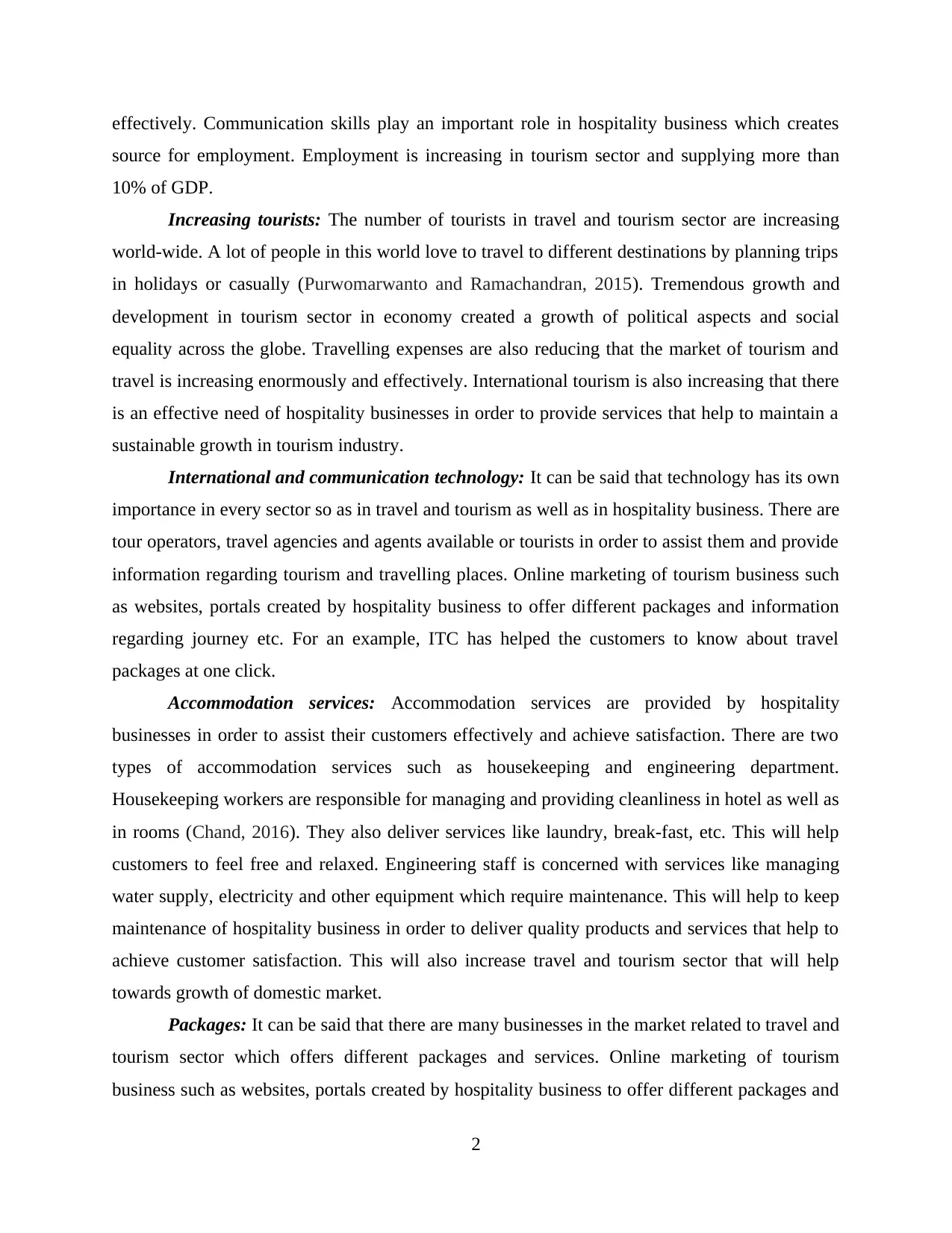
effectively. Communication skills play an important role in hospitality business which creates
source for employment. Employment is increasing in tourism sector and supplying more than
10% of GDP.
Increasing tourists: The number of tourists in travel and tourism sector are increasing
world-wide. A lot of people in this world love to travel to different destinations by planning trips
in holidays or casually (Purwomarwanto and Ramachandran, 2015). Tremendous growth and
development in tourism sector in economy created a growth of political aspects and social
equality across the globe. Travelling expenses are also reducing that the market of tourism and
travel is increasing enormously and effectively. International tourism is also increasing that there
is an effective need of hospitality businesses in order to provide services that help to maintain a
sustainable growth in tourism industry.
International and communication technology: It can be said that technology has its own
importance in every sector so as in travel and tourism as well as in hospitality business. There are
tour operators, travel agencies and agents available or tourists in order to assist them and provide
information regarding tourism and travelling places. Online marketing of tourism business such
as websites, portals created by hospitality business to offer different packages and information
regarding journey etc. For an example, ITC has helped the customers to know about travel
packages at one click.
Accommodation services: Accommodation services are provided by hospitality
businesses in order to assist their customers effectively and achieve satisfaction. There are two
types of accommodation services such as housekeeping and engineering department.
Housekeeping workers are responsible for managing and providing cleanliness in hotel as well as
in rooms (Chand, 2016). They also deliver services like laundry, break-fast, etc. This will help
customers to feel free and relaxed. Engineering staff is concerned with services like managing
water supply, electricity and other equipment which require maintenance. This will help to keep
maintenance of hospitality business in order to deliver quality products and services that help to
achieve customer satisfaction. This will also increase travel and tourism sector that will help
towards growth of domestic market.
Packages: It can be said that there are many businesses in the market related to travel and
tourism sector which offers different packages and services. Online marketing of tourism
business such as websites, portals created by hospitality business to offer different packages and
2
source for employment. Employment is increasing in tourism sector and supplying more than
10% of GDP.
Increasing tourists: The number of tourists in travel and tourism sector are increasing
world-wide. A lot of people in this world love to travel to different destinations by planning trips
in holidays or casually (Purwomarwanto and Ramachandran, 2015). Tremendous growth and
development in tourism sector in economy created a growth of political aspects and social
equality across the globe. Travelling expenses are also reducing that the market of tourism and
travel is increasing enormously and effectively. International tourism is also increasing that there
is an effective need of hospitality businesses in order to provide services that help to maintain a
sustainable growth in tourism industry.
International and communication technology: It can be said that technology has its own
importance in every sector so as in travel and tourism as well as in hospitality business. There are
tour operators, travel agencies and agents available or tourists in order to assist them and provide
information regarding tourism and travelling places. Online marketing of tourism business such
as websites, portals created by hospitality business to offer different packages and information
regarding journey etc. For an example, ITC has helped the customers to know about travel
packages at one click.
Accommodation services: Accommodation services are provided by hospitality
businesses in order to assist their customers effectively and achieve satisfaction. There are two
types of accommodation services such as housekeeping and engineering department.
Housekeeping workers are responsible for managing and providing cleanliness in hotel as well as
in rooms (Chand, 2016). They also deliver services like laundry, break-fast, etc. This will help
customers to feel free and relaxed. Engineering staff is concerned with services like managing
water supply, electricity and other equipment which require maintenance. This will help to keep
maintenance of hospitality business in order to deliver quality products and services that help to
achieve customer satisfaction. This will also increase travel and tourism sector that will help
towards growth of domestic market.
Packages: It can be said that there are many businesses in the market related to travel and
tourism sector which offers different packages and services. Online marketing of tourism
business such as websites, portals created by hospitality business to offer different packages and
2
Secure Best Marks with AI Grader
Need help grading? Try our AI Grader for instant feedback on your assignments.
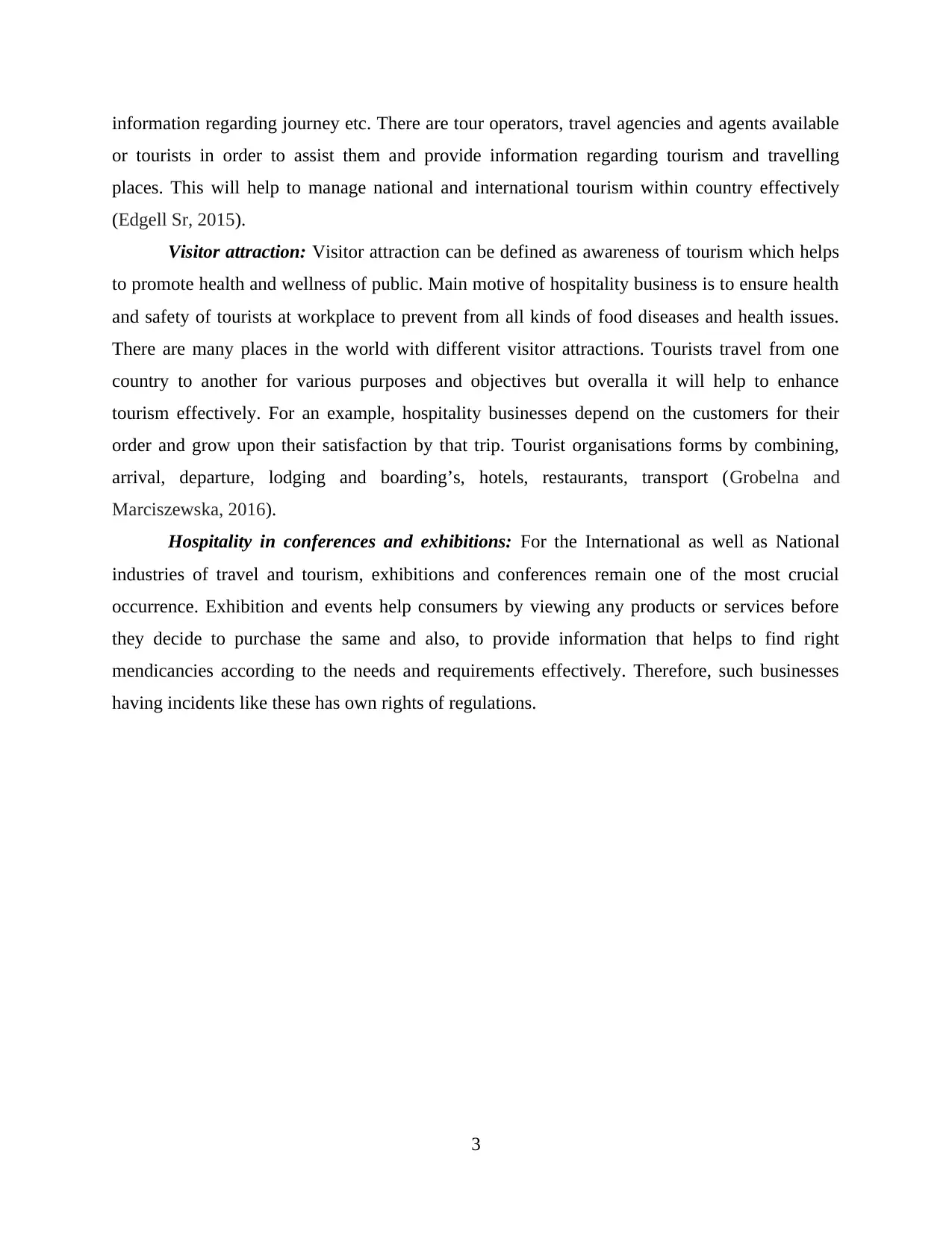
information regarding journey etc. There are tour operators, travel agencies and agents available
or tourists in order to assist them and provide information regarding tourism and travelling
places. This will help to manage national and international tourism within country effectively
(Edgell Sr, 2015).
Visitor attraction: Visitor attraction can be defined as awareness of tourism which helps
to promote health and wellness of public. Main motive of hospitality business is to ensure health
and safety of tourists at workplace to prevent from all kinds of food diseases and health issues.
There are many places in the world with different visitor attractions. Tourists travel from one
country to another for various purposes and objectives but overalla it will help to enhance
tourism effectively. For an example, hospitality businesses depend on the customers for their
order and grow upon their satisfaction by that trip. Tourist organisations forms by combining,
arrival, departure, lodging and boarding’s, hotels, restaurants, transport (Grobelna and
Marciszewska, 2016).
Hospitality in conferences and exhibitions: For the International as well as National
industries of travel and tourism, exhibitions and conferences remain one of the most crucial
occurrence. Exhibition and events help consumers by viewing any products or services before
they decide to purchase the same and also, to provide information that helps to find right
mendicancies according to the needs and requirements effectively. Therefore, such businesses
having incidents like these has own rights of regulations.
3
or tourists in order to assist them and provide information regarding tourism and travelling
places. This will help to manage national and international tourism within country effectively
(Edgell Sr, 2015).
Visitor attraction: Visitor attraction can be defined as awareness of tourism which helps
to promote health and wellness of public. Main motive of hospitality business is to ensure health
and safety of tourists at workplace to prevent from all kinds of food diseases and health issues.
There are many places in the world with different visitor attractions. Tourists travel from one
country to another for various purposes and objectives but overalla it will help to enhance
tourism effectively. For an example, hospitality businesses depend on the customers for their
order and grow upon their satisfaction by that trip. Tourist organisations forms by combining,
arrival, departure, lodging and boarding’s, hotels, restaurants, transport (Grobelna and
Marciszewska, 2016).
Hospitality in conferences and exhibitions: For the International as well as National
industries of travel and tourism, exhibitions and conferences remain one of the most crucial
occurrence. Exhibition and events help consumers by viewing any products or services before
they decide to purchase the same and also, to provide information that helps to find right
mendicancies according to the needs and requirements effectively. Therefore, such businesses
having incidents like these has own rights of regulations.
3
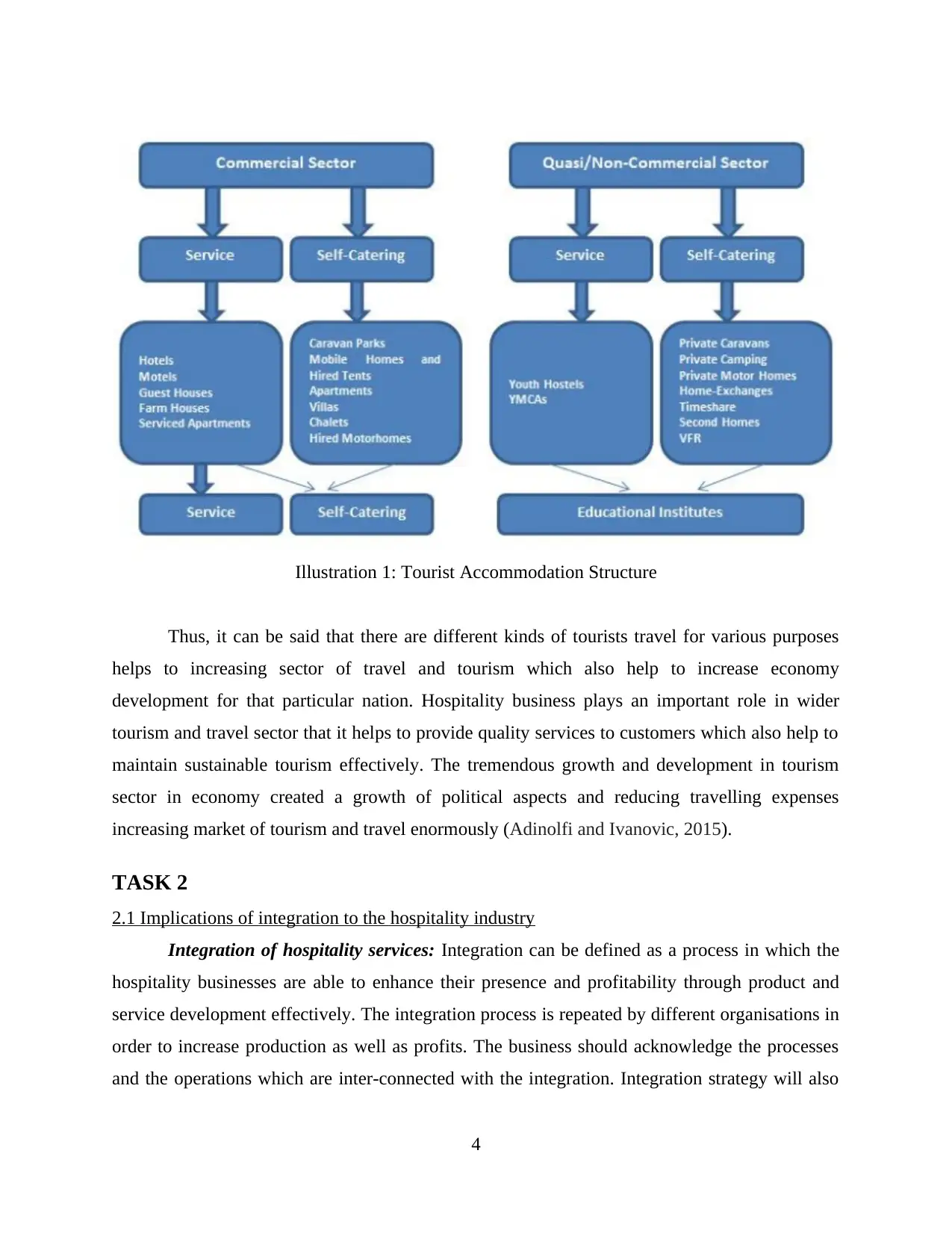
Thus, it can be said that there are different kinds of tourists travel for various purposes
helps to increasing sector of travel and tourism which also help to increase economy
development for that particular nation. Hospitality business plays an important role in wider
tourism and travel sector that it helps to provide quality services to customers which also help to
maintain sustainable tourism effectively. The tremendous growth and development in tourism
sector in economy created a growth of political aspects and reducing travelling expenses
increasing market of tourism and travel enormously (Adinolfi and Ivanovic, 2015).
TASK 2
2.1 Implications of integration to the hospitality industry
Integration of hospitality services: Integration can be defined as a process in which the
hospitality businesses are able to enhance their presence and profitability through product and
service development effectively. The integration process is repeated by different organisations in
order to increase production as well as profits. The business should acknowledge the processes
and the operations which are inter-connected with the integration. Integration strategy will also
4
Illustration 1: Tourist Accommodation Structure
helps to increasing sector of travel and tourism which also help to increase economy
development for that particular nation. Hospitality business plays an important role in wider
tourism and travel sector that it helps to provide quality services to customers which also help to
maintain sustainable tourism effectively. The tremendous growth and development in tourism
sector in economy created a growth of political aspects and reducing travelling expenses
increasing market of tourism and travel enormously (Adinolfi and Ivanovic, 2015).
TASK 2
2.1 Implications of integration to the hospitality industry
Integration of hospitality services: Integration can be defined as a process in which the
hospitality businesses are able to enhance their presence and profitability through product and
service development effectively. The integration process is repeated by different organisations in
order to increase production as well as profits. The business should acknowledge the processes
and the operations which are inter-connected with the integration. Integration strategy will also
4
Illustration 1: Tourist Accommodation Structure
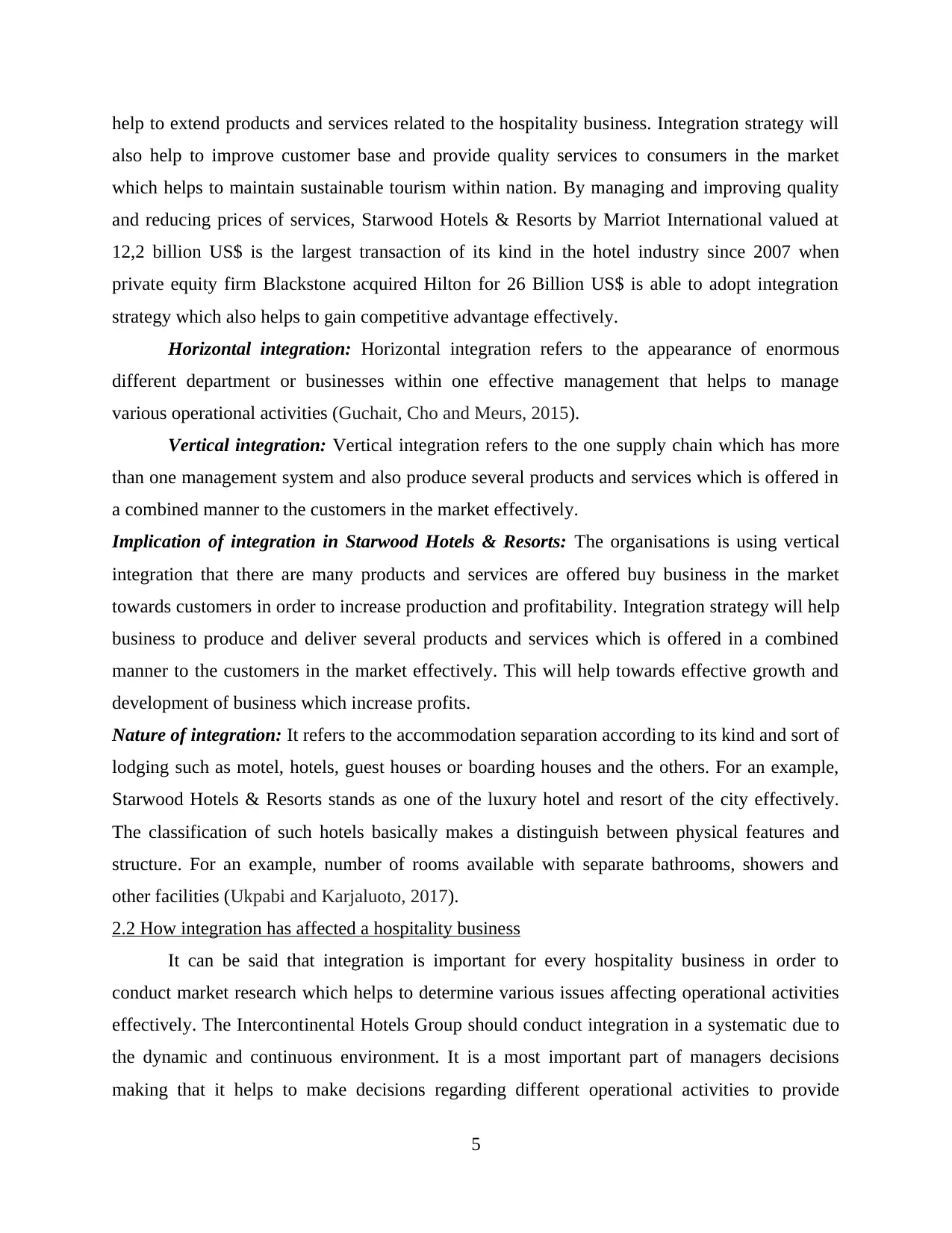
help to extend products and services related to the hospitality business. Integration strategy will
also help to improve customer base and provide quality services to consumers in the market
which helps to maintain sustainable tourism within nation. By managing and improving quality
and reducing prices of services, Starwood Hotels & Resorts by Marriot International valued at
12,2 billion US$ is the largest transaction of its kind in the hotel industry since 2007 when
private equity firm Blackstone acquired Hilton for 26 Billion US$ is able to adopt integration
strategy which also helps to gain competitive advantage effectively.
Horizontal integration: Horizontal integration refers to the appearance of enormous
different department or businesses within one effective management that helps to manage
various operational activities (Guchait, Cho and Meurs, 2015).
Vertical integration: Vertical integration refers to the one supply chain which has more
than one management system and also produce several products and services which is offered in
a combined manner to the customers in the market effectively.
Implication of integration in Starwood Hotels & Resorts: The organisations is using vertical
integration that there are many products and services are offered buy business in the market
towards customers in order to increase production and profitability. Integration strategy will help
business to produce and deliver several products and services which is offered in a combined
manner to the customers in the market effectively. This will help towards effective growth and
development of business which increase profits.
Nature of integration: It refers to the accommodation separation according to its kind and sort of
lodging such as motel, hotels, guest houses or boarding houses and the others. For an example,
Starwood Hotels & Resorts stands as one of the luxury hotel and resort of the city effectively.
The classification of such hotels basically makes a distinguish between physical features and
structure. For an example, number of rooms available with separate bathrooms, showers and
other facilities (Ukpabi and Karjaluoto, 2017).
2.2 How integration has affected a hospitality business
It can be said that integration is important for every hospitality business in order to
conduct market research which helps to determine various issues affecting operational activities
effectively. The Intercontinental Hotels Group should conduct integration in a systematic due to
the dynamic and continuous environment. It is a most important part of managers decisions
making that it helps to make decisions regarding different operational activities to provide
5
also help to improve customer base and provide quality services to consumers in the market
which helps to maintain sustainable tourism within nation. By managing and improving quality
and reducing prices of services, Starwood Hotels & Resorts by Marriot International valued at
12,2 billion US$ is the largest transaction of its kind in the hotel industry since 2007 when
private equity firm Blackstone acquired Hilton for 26 Billion US$ is able to adopt integration
strategy which also helps to gain competitive advantage effectively.
Horizontal integration: Horizontal integration refers to the appearance of enormous
different department or businesses within one effective management that helps to manage
various operational activities (Guchait, Cho and Meurs, 2015).
Vertical integration: Vertical integration refers to the one supply chain which has more
than one management system and also produce several products and services which is offered in
a combined manner to the customers in the market effectively.
Implication of integration in Starwood Hotels & Resorts: The organisations is using vertical
integration that there are many products and services are offered buy business in the market
towards customers in order to increase production and profitability. Integration strategy will help
business to produce and deliver several products and services which is offered in a combined
manner to the customers in the market effectively. This will help towards effective growth and
development of business which increase profits.
Nature of integration: It refers to the accommodation separation according to its kind and sort of
lodging such as motel, hotels, guest houses or boarding houses and the others. For an example,
Starwood Hotels & Resorts stands as one of the luxury hotel and resort of the city effectively.
The classification of such hotels basically makes a distinguish between physical features and
structure. For an example, number of rooms available with separate bathrooms, showers and
other facilities (Ukpabi and Karjaluoto, 2017).
2.2 How integration has affected a hospitality business
It can be said that integration is important for every hospitality business in order to
conduct market research which helps to determine various issues affecting operational activities
effectively. The Intercontinental Hotels Group should conduct integration in a systematic due to
the dynamic and continuous environment. It is a most important part of managers decisions
making that it helps to make decisions regarding different operational activities to provide
5
Paraphrase This Document
Need a fresh take? Get an instant paraphrase of this document with our AI Paraphraser
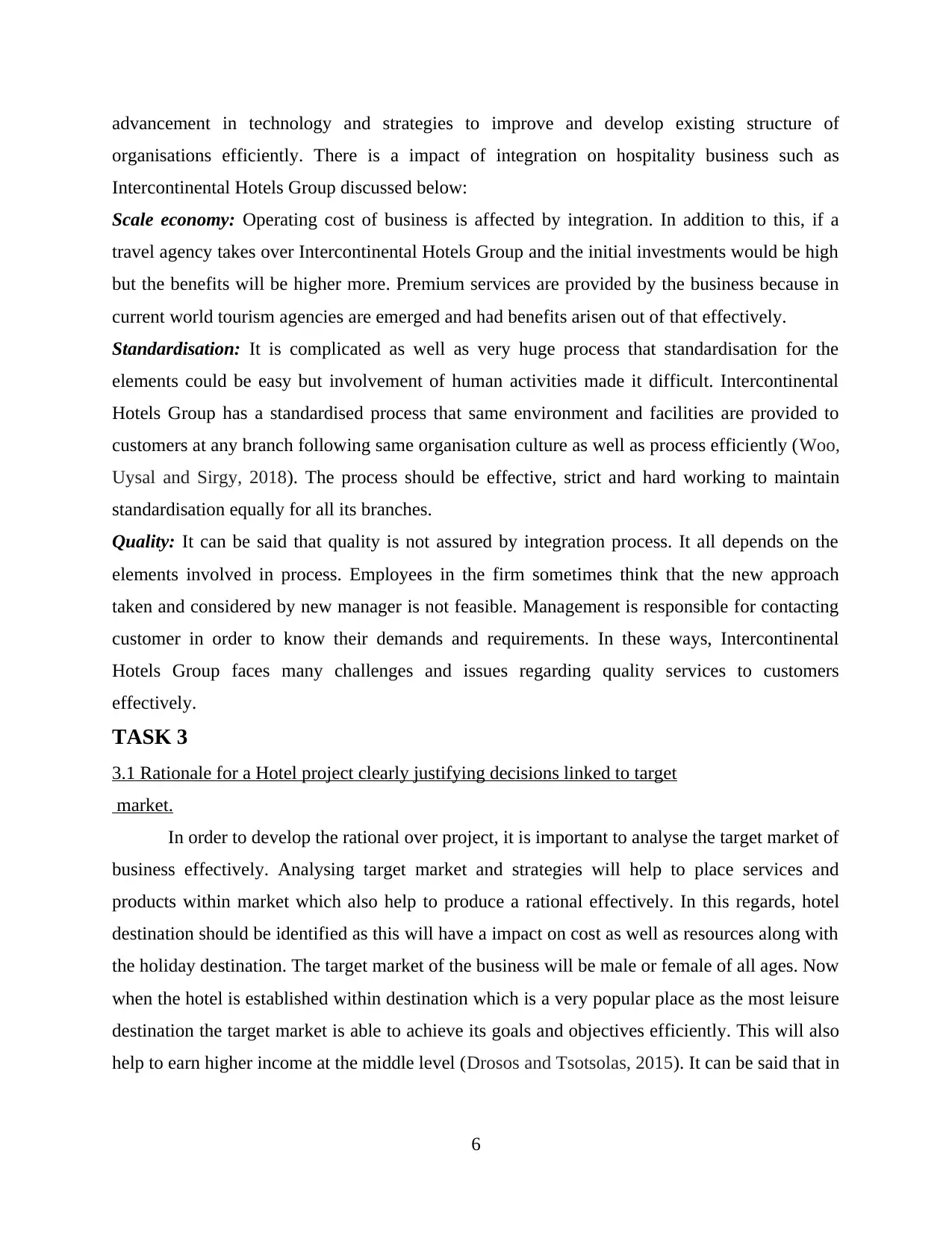
advancement in technology and strategies to improve and develop existing structure of
organisations efficiently. There is a impact of integration on hospitality business such as
Intercontinental Hotels Group discussed below:
Scale economy: Operating cost of business is affected by integration. In addition to this, if a
travel agency takes over Intercontinental Hotels Group and the initial investments would be high
but the benefits will be higher more. Premium services are provided by the business because in
current world tourism agencies are emerged and had benefits arisen out of that effectively.
Standardisation: It is complicated as well as very huge process that standardisation for the
elements could be easy but involvement of human activities made it difficult. Intercontinental
Hotels Group has a standardised process that same environment and facilities are provided to
customers at any branch following same organisation culture as well as process efficiently (Woo,
Uysal and Sirgy, 2018). The process should be effective, strict and hard working to maintain
standardisation equally for all its branches.
Quality: It can be said that quality is not assured by integration process. It all depends on the
elements involved in process. Employees in the firm sometimes think that the new approach
taken and considered by new manager is not feasible. Management is responsible for contacting
customer in order to know their demands and requirements. In these ways, Intercontinental
Hotels Group faces many challenges and issues regarding quality services to customers
effectively.
TASK 3
3.1 Rationale for a Hotel project clearly justifying decisions linked to target
market.
In order to develop the rational over project, it is important to analyse the target market of
business effectively. Analysing target market and strategies will help to place services and
products within market which also help to produce a rational effectively. In this regards, hotel
destination should be identified as this will have a impact on cost as well as resources along with
the holiday destination. The target market of the business will be male or female of all ages. Now
when the hotel is established within destination which is a very popular place as the most leisure
destination the target market is able to achieve its goals and objectives efficiently. This will also
help to earn higher income at the middle level (Drosos and Tsotsolas, 2015). It can be said that in
6
organisations efficiently. There is a impact of integration on hospitality business such as
Intercontinental Hotels Group discussed below:
Scale economy: Operating cost of business is affected by integration. In addition to this, if a
travel agency takes over Intercontinental Hotels Group and the initial investments would be high
but the benefits will be higher more. Premium services are provided by the business because in
current world tourism agencies are emerged and had benefits arisen out of that effectively.
Standardisation: It is complicated as well as very huge process that standardisation for the
elements could be easy but involvement of human activities made it difficult. Intercontinental
Hotels Group has a standardised process that same environment and facilities are provided to
customers at any branch following same organisation culture as well as process efficiently (Woo,
Uysal and Sirgy, 2018). The process should be effective, strict and hard working to maintain
standardisation equally for all its branches.
Quality: It can be said that quality is not assured by integration process. It all depends on the
elements involved in process. Employees in the firm sometimes think that the new approach
taken and considered by new manager is not feasible. Management is responsible for contacting
customer in order to know their demands and requirements. In these ways, Intercontinental
Hotels Group faces many challenges and issues regarding quality services to customers
effectively.
TASK 3
3.1 Rationale for a Hotel project clearly justifying decisions linked to target
market.
In order to develop the rational over project, it is important to analyse the target market of
business effectively. Analysing target market and strategies will help to place services and
products within market which also help to produce a rational effectively. In this regards, hotel
destination should be identified as this will have a impact on cost as well as resources along with
the holiday destination. The target market of the business will be male or female of all ages. Now
when the hotel is established within destination which is a very popular place as the most leisure
destination the target market is able to achieve its goals and objectives efficiently. This will also
help to earn higher income at the middle level (Drosos and Tsotsolas, 2015). It can be said that in
6
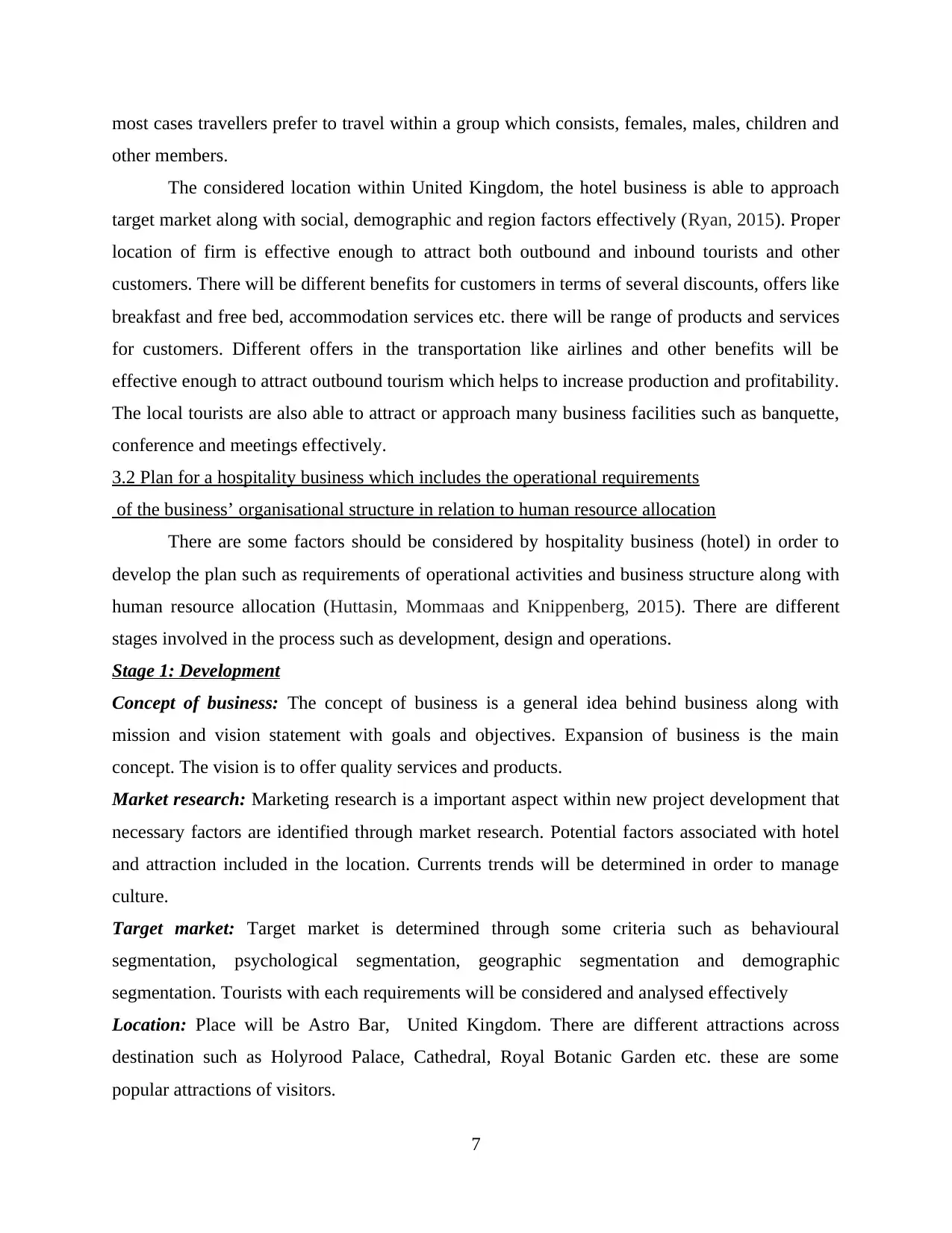
most cases travellers prefer to travel within a group which consists, females, males, children and
other members.
The considered location within United Kingdom, the hotel business is able to approach
target market along with social, demographic and region factors effectively (Ryan, 2015). Proper
location of firm is effective enough to attract both outbound and inbound tourists and other
customers. There will be different benefits for customers in terms of several discounts, offers like
breakfast and free bed, accommodation services etc. there will be range of products and services
for customers. Different offers in the transportation like airlines and other benefits will be
effective enough to attract outbound tourism which helps to increase production and profitability.
The local tourists are also able to attract or approach many business facilities such as banquette,
conference and meetings effectively.
3.2 Plan for a hospitality business which includes the operational requirements
of the business’ organisational structure in relation to human resource allocation
There are some factors should be considered by hospitality business (hotel) in order to
develop the plan such as requirements of operational activities and business structure along with
human resource allocation (Huttasin, Mommaas and Knippenberg, 2015). There are different
stages involved in the process such as development, design and operations.
Stage 1: Development
Concept of business: The concept of business is a general idea behind business along with
mission and vision statement with goals and objectives. Expansion of business is the main
concept. The vision is to offer quality services and products.
Market research: Marketing research is a important aspect within new project development that
necessary factors are identified through market research. Potential factors associated with hotel
and attraction included in the location. Currents trends will be determined in order to manage
culture.
Target market: Target market is determined through some criteria such as behavioural
segmentation, psychological segmentation, geographic segmentation and demographic
segmentation. Tourists with each requirements will be considered and analysed effectively
Location: Place will be Astro Bar, United Kingdom. There are different attractions across
destination such as Holyrood Palace, Cathedral, Royal Botanic Garden etc. these are some
popular attractions of visitors.
7
other members.
The considered location within United Kingdom, the hotel business is able to approach
target market along with social, demographic and region factors effectively (Ryan, 2015). Proper
location of firm is effective enough to attract both outbound and inbound tourists and other
customers. There will be different benefits for customers in terms of several discounts, offers like
breakfast and free bed, accommodation services etc. there will be range of products and services
for customers. Different offers in the transportation like airlines and other benefits will be
effective enough to attract outbound tourism which helps to increase production and profitability.
The local tourists are also able to attract or approach many business facilities such as banquette,
conference and meetings effectively.
3.2 Plan for a hospitality business which includes the operational requirements
of the business’ organisational structure in relation to human resource allocation
There are some factors should be considered by hospitality business (hotel) in order to
develop the plan such as requirements of operational activities and business structure along with
human resource allocation (Huttasin, Mommaas and Knippenberg, 2015). There are different
stages involved in the process such as development, design and operations.
Stage 1: Development
Concept of business: The concept of business is a general idea behind business along with
mission and vision statement with goals and objectives. Expansion of business is the main
concept. The vision is to offer quality services and products.
Market research: Marketing research is a important aspect within new project development that
necessary factors are identified through market research. Potential factors associated with hotel
and attraction included in the location. Currents trends will be determined in order to manage
culture.
Target market: Target market is determined through some criteria such as behavioural
segmentation, psychological segmentation, geographic segmentation and demographic
segmentation. Tourists with each requirements will be considered and analysed effectively
Location: Place will be Astro Bar, United Kingdom. There are different attractions across
destination such as Holyrood Palace, Cathedral, Royal Botanic Garden etc. these are some
popular attractions of visitors.
7
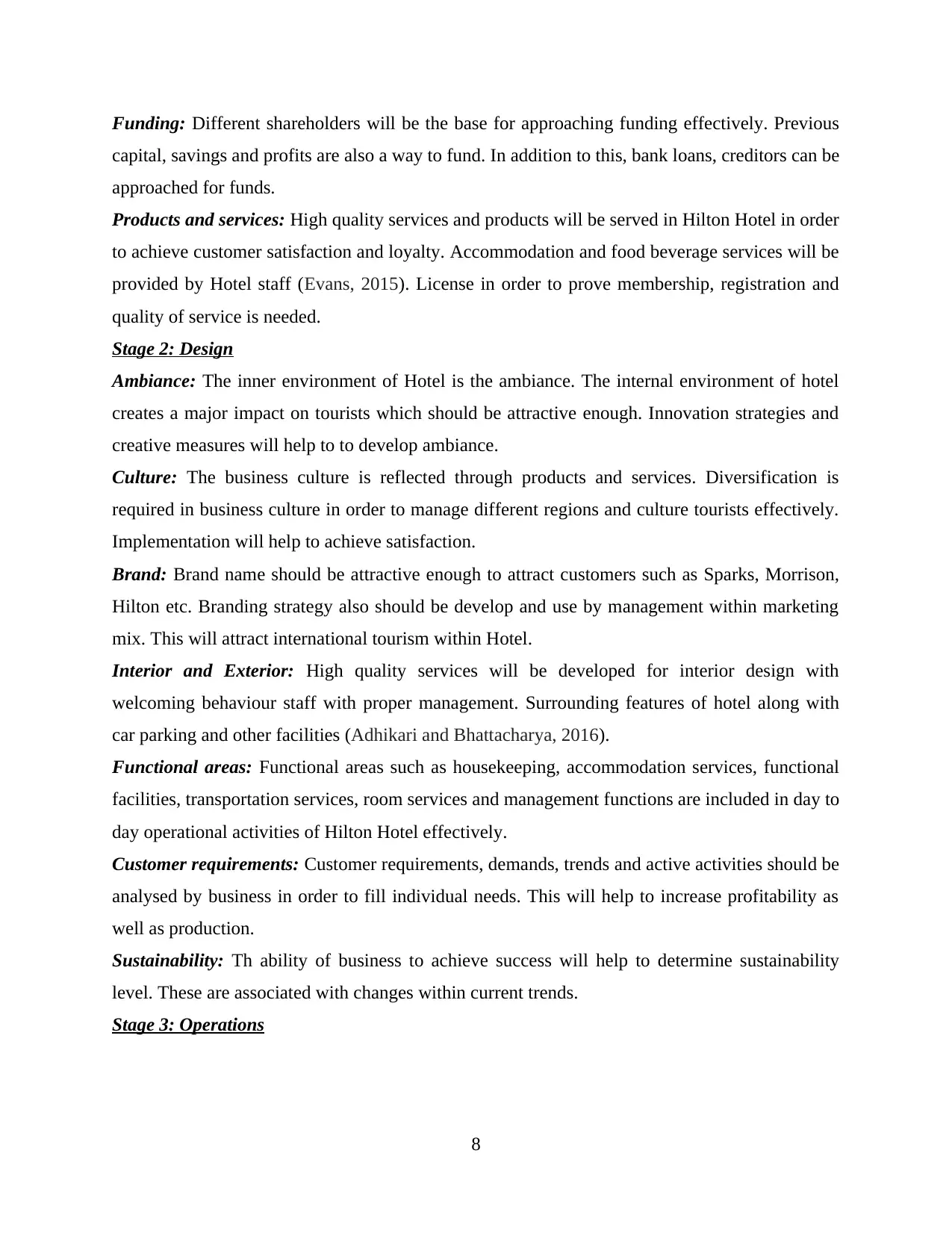
Funding: Different shareholders will be the base for approaching funding effectively. Previous
capital, savings and profits are also a way to fund. In addition to this, bank loans, creditors can be
approached for funds.
Products and services: High quality services and products will be served in Hilton Hotel in order
to achieve customer satisfaction and loyalty. Accommodation and food beverage services will be
provided by Hotel staff (Evans, 2015). License in order to prove membership, registration and
quality of service is needed.
Stage 2: Design
Ambiance: The inner environment of Hotel is the ambiance. The internal environment of hotel
creates a major impact on tourists which should be attractive enough. Innovation strategies and
creative measures will help to to develop ambiance.
Culture: The business culture is reflected through products and services. Diversification is
required in business culture in order to manage different regions and culture tourists effectively.
Implementation will help to achieve satisfaction.
Brand: Brand name should be attractive enough to attract customers such as Sparks, Morrison,
Hilton etc. Branding strategy also should be develop and use by management within marketing
mix. This will attract international tourism within Hotel.
Interior and Exterior: High quality services will be developed for interior design with
welcoming behaviour staff with proper management. Surrounding features of hotel along with
car parking and other facilities (Adhikari and Bhattacharya, 2016).
Functional areas: Functional areas such as housekeeping, accommodation services, functional
facilities, transportation services, room services and management functions are included in day to
day operational activities of Hilton Hotel effectively.
Customer requirements: Customer requirements, demands, trends and active activities should be
analysed by business in order to fill individual needs. This will help to increase profitability as
well as production.
Sustainability: Th ability of business to achieve success will help to determine sustainability
level. These are associated with changes within current trends.
Stage 3: Operations
8
capital, savings and profits are also a way to fund. In addition to this, bank loans, creditors can be
approached for funds.
Products and services: High quality services and products will be served in Hilton Hotel in order
to achieve customer satisfaction and loyalty. Accommodation and food beverage services will be
provided by Hotel staff (Evans, 2015). License in order to prove membership, registration and
quality of service is needed.
Stage 2: Design
Ambiance: The inner environment of Hotel is the ambiance. The internal environment of hotel
creates a major impact on tourists which should be attractive enough. Innovation strategies and
creative measures will help to to develop ambiance.
Culture: The business culture is reflected through products and services. Diversification is
required in business culture in order to manage different regions and culture tourists effectively.
Implementation will help to achieve satisfaction.
Brand: Brand name should be attractive enough to attract customers such as Sparks, Morrison,
Hilton etc. Branding strategy also should be develop and use by management within marketing
mix. This will attract international tourism within Hotel.
Interior and Exterior: High quality services will be developed for interior design with
welcoming behaviour staff with proper management. Surrounding features of hotel along with
car parking and other facilities (Adhikari and Bhattacharya, 2016).
Functional areas: Functional areas such as housekeeping, accommodation services, functional
facilities, transportation services, room services and management functions are included in day to
day operational activities of Hilton Hotel effectively.
Customer requirements: Customer requirements, demands, trends and active activities should be
analysed by business in order to fill individual needs. This will help to increase profitability as
well as production.
Sustainability: Th ability of business to achieve success will help to determine sustainability
level. These are associated with changes within current trends.
Stage 3: Operations
8
Secure Best Marks with AI Grader
Need help grading? Try our AI Grader for instant feedback on your assignments.
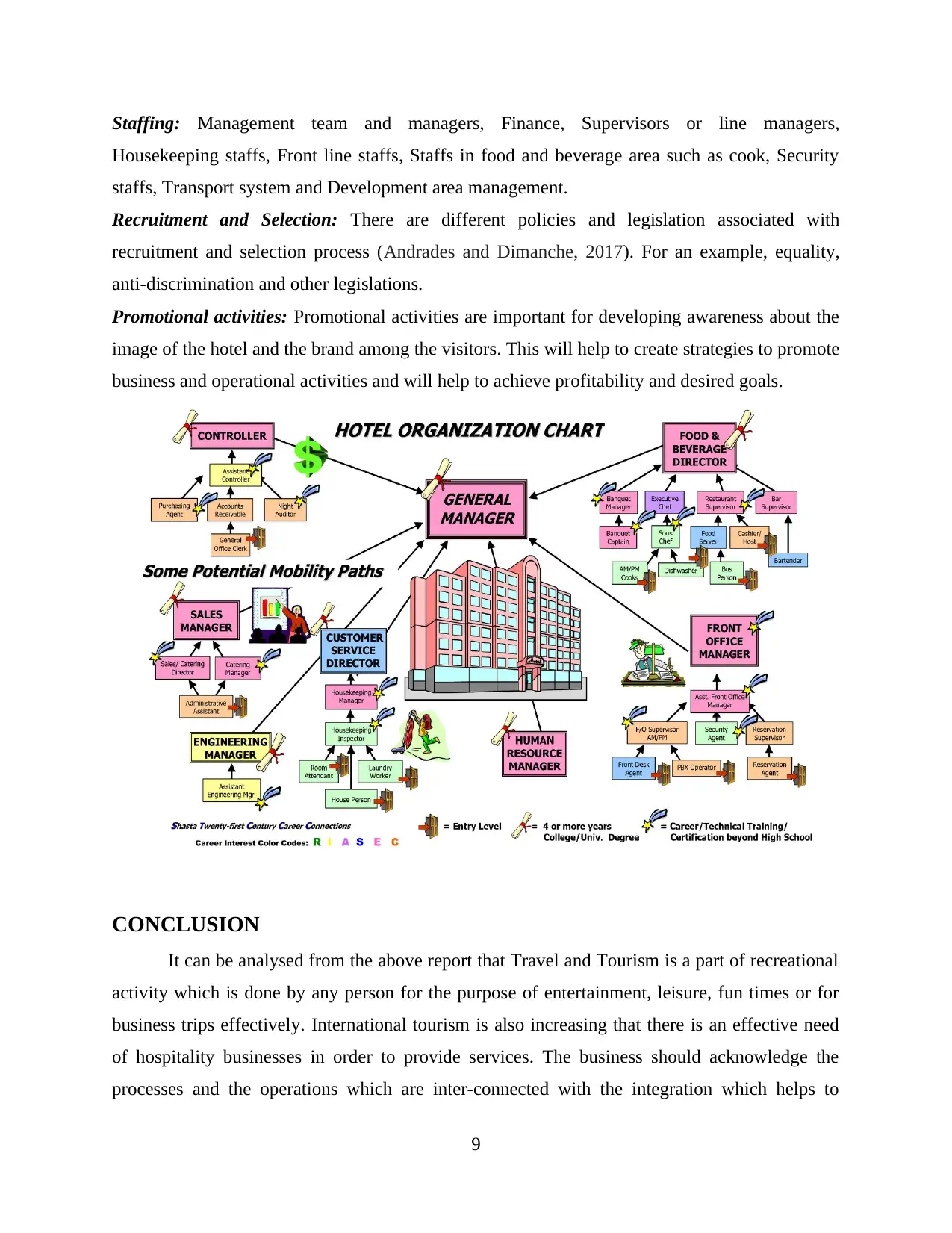
Staffing: Management team and managers, Finance, Supervisors or line managers,
Housekeeping staffs, Front line staffs, Staffs in food and beverage area such as cook, Security
staffs, Transport system and Development area management.
Recruitment and Selection: There are different policies and legislation associated with
recruitment and selection process (Andrades and Dimanche, 2017). For an example, equality,
anti-discrimination and other legislations.
Promotional activities: Promotional activities are important for developing awareness about the
image of the hotel and the brand among the visitors. This will help to create strategies to promote
business and operational activities and will help to achieve profitability and desired goals.
CONCLUSION
It can be analysed from the above report that Travel and Tourism is a part of recreational
activity which is done by any person for the purpose of entertainment, leisure, fun times or for
business trips effectively. International tourism is also increasing that there is an effective need
of hospitality businesses in order to provide services. The business should acknowledge the
processes and the operations which are inter-connected with the integration which helps to
9
Housekeeping staffs, Front line staffs, Staffs in food and beverage area such as cook, Security
staffs, Transport system and Development area management.
Recruitment and Selection: There are different policies and legislation associated with
recruitment and selection process (Andrades and Dimanche, 2017). For an example, equality,
anti-discrimination and other legislations.
Promotional activities: Promotional activities are important for developing awareness about the
image of the hotel and the brand among the visitors. This will help to create strategies to promote
business and operational activities and will help to achieve profitability and desired goals.
CONCLUSION
It can be analysed from the above report that Travel and Tourism is a part of recreational
activity which is done by any person for the purpose of entertainment, leisure, fun times or for
business trips effectively. International tourism is also increasing that there is an effective need
of hospitality businesses in order to provide services. The business should acknowledge the
processes and the operations which are inter-connected with the integration which helps to
9
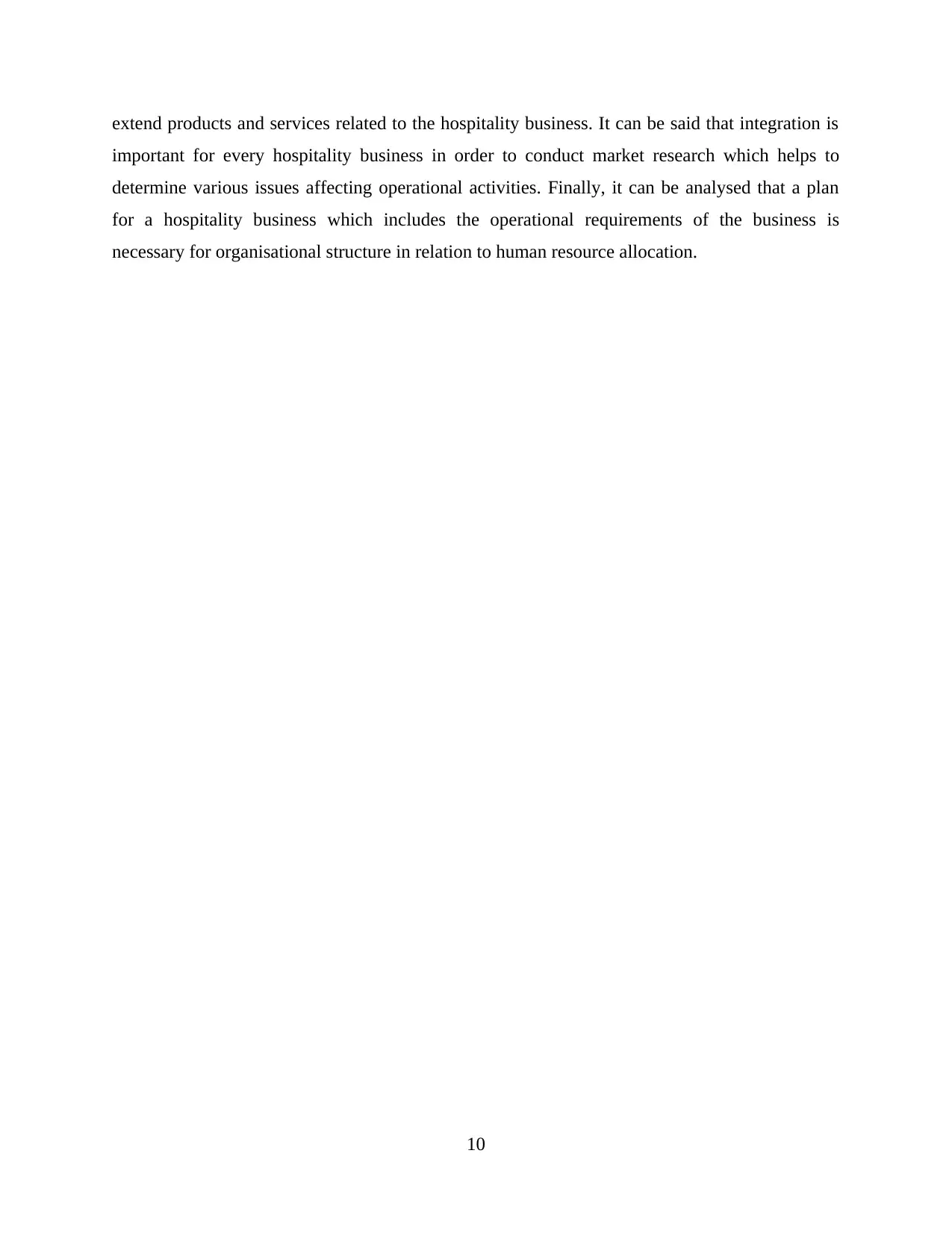
extend products and services related to the hospitality business. It can be said that integration is
important for every hospitality business in order to conduct market research which helps to
determine various issues affecting operational activities. Finally, it can be analysed that a plan
for a hospitality business which includes the operational requirements of the business is
necessary for organisational structure in relation to human resource allocation.
10
important for every hospitality business in order to conduct market research which helps to
determine various issues affecting operational activities. Finally, it can be analysed that a plan
for a hospitality business which includes the operational requirements of the business is
necessary for organisational structure in relation to human resource allocation.
10
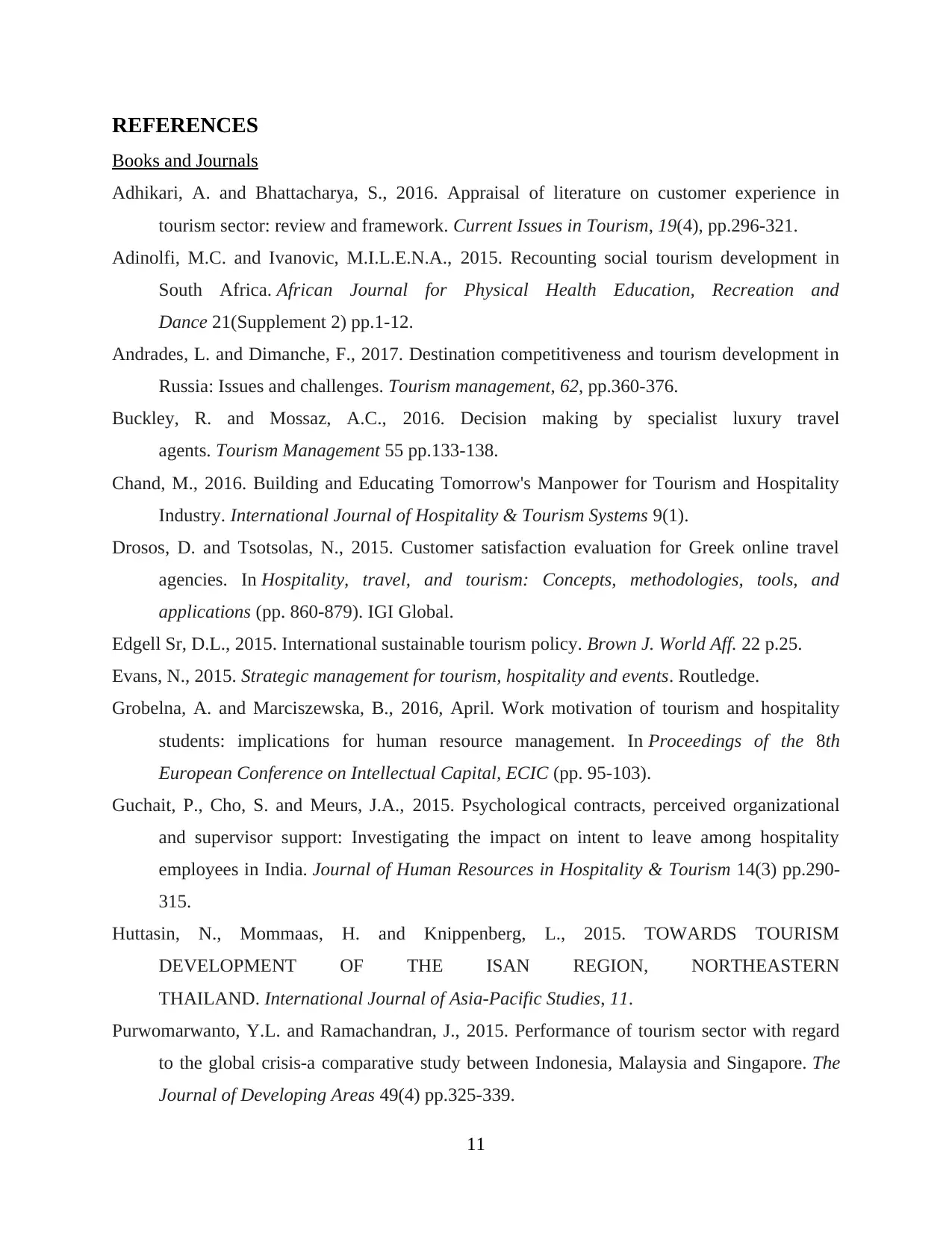
REFERENCES
Books and Journals
Adhikari, A. and Bhattacharya, S., 2016. Appraisal of literature on customer experience in
tourism sector: review and framework. Current Issues in Tourism, 19(4), pp.296-321.
Adinolfi, M.C. and Ivanovic, M.I.L.E.N.A., 2015. Recounting social tourism development in
South Africa. African Journal for Physical Health Education, Recreation and
Dance 21(Supplement 2) pp.1-12.
Andrades, L. and Dimanche, F., 2017. Destination competitiveness and tourism development in
Russia: Issues and challenges. Tourism management, 62, pp.360-376.
Buckley, R. and Mossaz, A.C., 2016. Decision making by specialist luxury travel
agents. Tourism Management 55 pp.133-138.
Chand, M., 2016. Building and Educating Tomorrow's Manpower for Tourism and Hospitality
Industry. International Journal of Hospitality & Tourism Systems 9(1).
Drosos, D. and Tsotsolas, N., 2015. Customer satisfaction evaluation for Greek online travel
agencies. In Hospitality, travel, and tourism: Concepts, methodologies, tools, and
applications (pp. 860-879). IGI Global.
Edgell Sr, D.L., 2015. International sustainable tourism policy. Brown J. World Aff. 22 p.25.
Evans, N., 2015. Strategic management for tourism, hospitality and events. Routledge.
Grobelna, A. and Marciszewska, B., 2016, April. Work motivation of tourism and hospitality
students: implications for human resource management. In Proceedings of the 8th
European Conference on Intellectual Capital, ECIC (pp. 95-103).
Guchait, P., Cho, S. and Meurs, J.A., 2015. Psychological contracts, perceived organizational
and supervisor support: Investigating the impact on intent to leave among hospitality
employees in India. Journal of Human Resources in Hospitality & Tourism 14(3) pp.290-
315.
Huttasin, N., Mommaas, H. and Knippenberg, L., 2015. TOWARDS TOURISM
DEVELOPMENT OF THE ISAN REGION, NORTHEASTERN
THAILAND. International Journal of Asia-Pacific Studies, 11.
Purwomarwanto, Y.L. and Ramachandran, J., 2015. Performance of tourism sector with regard
to the global crisis-a comparative study between Indonesia, Malaysia and Singapore. The
Journal of Developing Areas 49(4) pp.325-339.
11
Books and Journals
Adhikari, A. and Bhattacharya, S., 2016. Appraisal of literature on customer experience in
tourism sector: review and framework. Current Issues in Tourism, 19(4), pp.296-321.
Adinolfi, M.C. and Ivanovic, M.I.L.E.N.A., 2015. Recounting social tourism development in
South Africa. African Journal for Physical Health Education, Recreation and
Dance 21(Supplement 2) pp.1-12.
Andrades, L. and Dimanche, F., 2017. Destination competitiveness and tourism development in
Russia: Issues and challenges. Tourism management, 62, pp.360-376.
Buckley, R. and Mossaz, A.C., 2016. Decision making by specialist luxury travel
agents. Tourism Management 55 pp.133-138.
Chand, M., 2016. Building and Educating Tomorrow's Manpower for Tourism and Hospitality
Industry. International Journal of Hospitality & Tourism Systems 9(1).
Drosos, D. and Tsotsolas, N., 2015. Customer satisfaction evaluation for Greek online travel
agencies. In Hospitality, travel, and tourism: Concepts, methodologies, tools, and
applications (pp. 860-879). IGI Global.
Edgell Sr, D.L., 2015. International sustainable tourism policy. Brown J. World Aff. 22 p.25.
Evans, N., 2015. Strategic management for tourism, hospitality and events. Routledge.
Grobelna, A. and Marciszewska, B., 2016, April. Work motivation of tourism and hospitality
students: implications for human resource management. In Proceedings of the 8th
European Conference on Intellectual Capital, ECIC (pp. 95-103).
Guchait, P., Cho, S. and Meurs, J.A., 2015. Psychological contracts, perceived organizational
and supervisor support: Investigating the impact on intent to leave among hospitality
employees in India. Journal of Human Resources in Hospitality & Tourism 14(3) pp.290-
315.
Huttasin, N., Mommaas, H. and Knippenberg, L., 2015. TOWARDS TOURISM
DEVELOPMENT OF THE ISAN REGION, NORTHEASTERN
THAILAND. International Journal of Asia-Pacific Studies, 11.
Purwomarwanto, Y.L. and Ramachandran, J., 2015. Performance of tourism sector with regard
to the global crisis-a comparative study between Indonesia, Malaysia and Singapore. The
Journal of Developing Areas 49(4) pp.325-339.
11
Paraphrase This Document
Need a fresh take? Get an instant paraphrase of this document with our AI Paraphraser
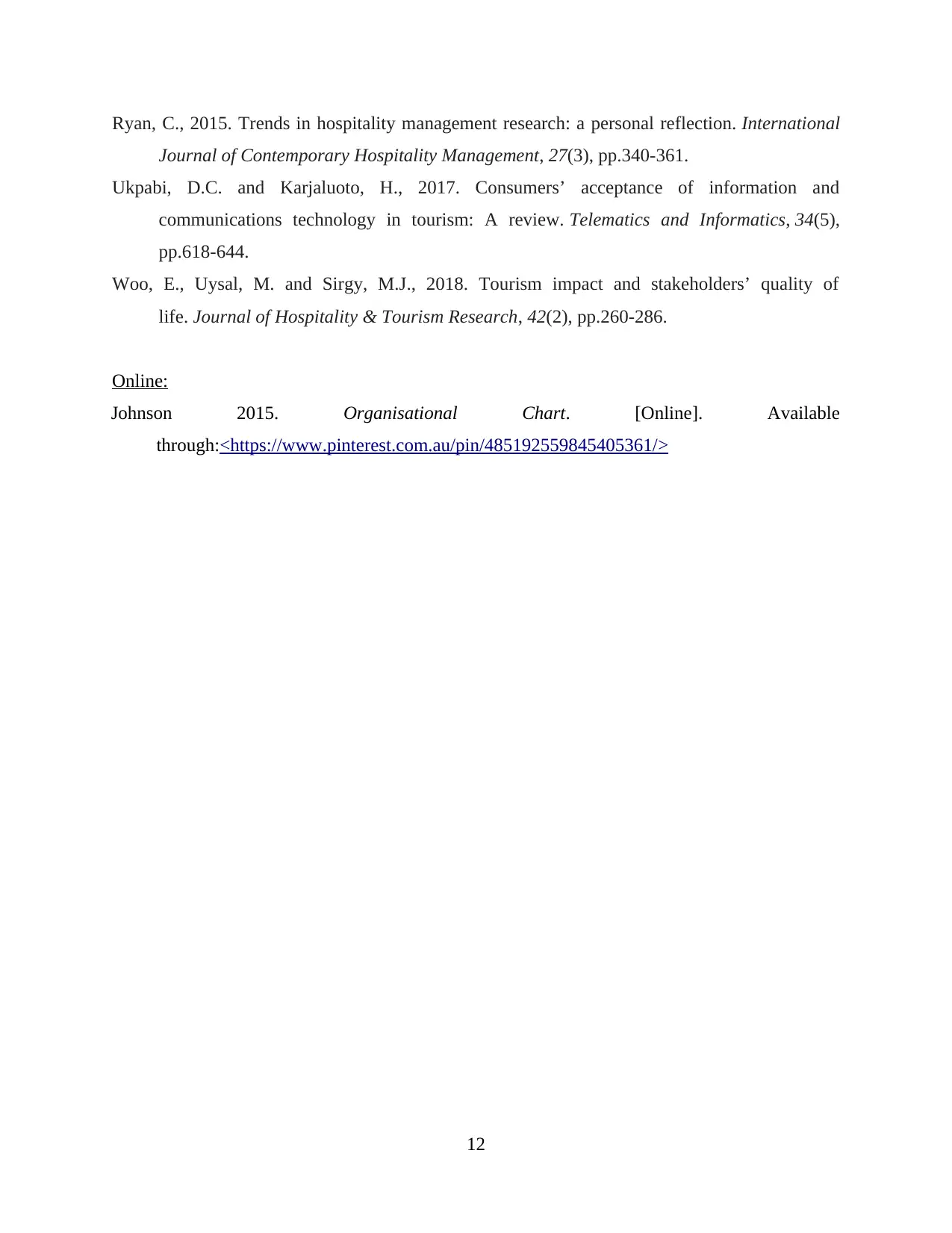
Ryan, C., 2015. Trends in hospitality management research: a personal reflection. International
Journal of Contemporary Hospitality Management, 27(3), pp.340-361.
Ukpabi, D.C. and Karjaluoto, H., 2017. Consumers’ acceptance of information and
communications technology in tourism: A review. Telematics and Informatics, 34(5),
pp.618-644.
Woo, E., Uysal, M. and Sirgy, M.J., 2018. Tourism impact and stakeholders’ quality of
life. Journal of Hospitality & Tourism Research, 42(2), pp.260-286.
Online:
Johnson 2015. Organisational Chart. [Online]. Available
through:<https://www.pinterest.com.au/pin/485192559845405361/>
12
Journal of Contemporary Hospitality Management, 27(3), pp.340-361.
Ukpabi, D.C. and Karjaluoto, H., 2017. Consumers’ acceptance of information and
communications technology in tourism: A review. Telematics and Informatics, 34(5),
pp.618-644.
Woo, E., Uysal, M. and Sirgy, M.J., 2018. Tourism impact and stakeholders’ quality of
life. Journal of Hospitality & Tourism Research, 42(2), pp.260-286.
Online:
Johnson 2015. Organisational Chart. [Online]. Available
through:<https://www.pinterest.com.au/pin/485192559845405361/>
12
1 out of 14
Related Documents
Your All-in-One AI-Powered Toolkit for Academic Success.
+13062052269
info@desklib.com
Available 24*7 on WhatsApp / Email
![[object Object]](/_next/static/media/star-bottom.7253800d.svg)
Unlock your academic potential
© 2024 | Zucol Services PVT LTD | All rights reserved.





